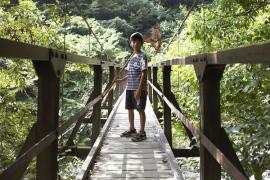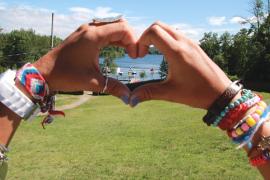Few people would disagree that we now live in a world of consumer capitalism. Our open lands and lakefronts in New England are slowly disappearing to development. Many young children are over stimulated and over scheduled. This generation, more than any other in our history, needs the calming and regenerative powers of living close to the natural rhythms and flow of nature.
For a number of years, I have been concerned that the business of children's overnight camps, so cherished by millions of people, may have lost touch with some of its roots. I have had a long career as a camp director and have had the opportunity to visit many camps in New England during my tenure in camping. Over the past thirty years, I have noticed a change in the focus and development of the camping industry.
Early children's camps were started throughout New England by individuals who had prior careers as doctors, teachers, school guidance counselors, and college and high school coaches. While land was considerably less expensive back then, these pioneers in camping relied on bank mortgages, friends, and family to provide seed money for what must have felt like a risky enterprise. Most camps had rustic buildings, few graded sports fields, and fewer amenities such as tennis courts and even hot showers. I attended one of these camps myself beginning in 1953. In my opinion, as the camping industry grew and competition became brisk, many of these camps moved away from their simple roots and developed into facilities that resembled resorts.
I have always felt that the value of a camp experience lies in taking campers out of their suburban comfort zones and sharing with them the power of living close to nature in simple surroundings. Back in 1988, through a number of serendipitous circumstances, I signed a lease and began payments on a camp in Maine with only four thousand dollars in savings.
Here is what I've learned over my twenty-five years as owner of Camp Hawthorne.
Camp Setting
A camp setting should feel like a little village where everyone knows each other by name and children are free to move around the camp perimeter with only limited restrictions under the supervision of caring adults.
According to our camp folklore, back in 1918, the founder of Camp Hawthorne, Major Bigelow, searched the entire state of Maine for the perfect lakeside property to begin his camping business. He came across a small farm on the edge of Panther Pond. With over two miles of shorefront and a mile of sandy beach with fields and woodlands, it had what many believed to be the most beautiful beachfront property in the state. And Camp Hawthorne was born.
The owner of the farm property, David Plummer, built the cabins and dining hall that still stand today. The cabins were simple structures perched on a knoll overlooking the lake. Hardly more substantial than a chicken coop, it is amazing that all of the structures have survived the harsh Maine winters.
When I took over the lease of the camp in 1988, I was concerned that the rustic look of the camp buildings might be off-putting to some parents and/or campers. What I soon discovered was that from the children's point of view, the simple, livedin construction of the property helped them feel more invested in the camp as their summer home.
Maybe the cabins reminded the campers of an old fort or clubhouse they built themselves with friends in their hometown neighborhood. Maybe they felt they could have built their cabins themselves with some hand tools and a box of nails.
Many of the supporting beams of the cabins were signed and dated with the names of prior campers going back as far as 1919. Campers could lie on their cots, read the names, and imagine what camp was like back then. The buildings were far from perfect, but they seemed to have a soul of their own and an aura of contentment.
Letting Kids Be Kids
Our camp was a good match for the sensibilities of the children. They could secretly add their own name on the underside of a window frame and no one minded. A projectile could pierce a hole in a screen door and with a little duct tape could be repaired without punishment. Each day tons of sand would be transported from the beach into the bunk on dirty feet to be recycled and swept out the door the following morning.
The Rustic Campfire
Evening campfires were a sacred time at camp. Our campfire site was situated at the edge of the lake, which gave us a perfect view of the moon rising over the water. We sat on old logs surrounding the fire pit and burned pine branches we all collected from the woods. With the campfire lighting their shiny faces, campers eagerly waited to hear their favorite camp stories and for the camp musicians to play and lead us in familiar songs. It was as if they waited all winter to return to camp for this gathering alone, to again be together among the tall pines on the edge of Panther Pond. The campfire site was their Stonehenge — holy ground to most of our little campers.
Once a week, each cabin group hiked to their own special fire pit carrying food and water for a meal they would prepare themselves over an open fire. Each camper sought out the perfect stick on which to roast a hot dog or sausage over the fire. It was easy for campers to imagine how their ancestors would sit by a similar fire to cook and hear the oral traditions of their people.
Self-Reliance and Community
Canoeing down a river, climbing mountains, camp craft skills, archery, and tree fort building are all camp activities that have stood the test of time and deserve to be passed on to today's youth. Children need to develop a psychological foundation that they can rely on in adolescence and early adulthood. Learning to live close to nature, relying on one's own imagination to entertain oneself and one's friends, feeling grounded, living cooperatively with others, and developing an independent sense of oneself are experiences that strengthen the souls of our children.
Summer camp has always supported the psychological growth of children. Living simply and communally in a rustic, natural setting away from the pressures of school life and the distractions of mass media can both comfort and strengthen the foundation of children's emerging sense of self. Nature is a wonderful healer of the soul. We all need to support our connections to the natural world whenever possible. Nothing fancy is needed — when it comes to camp, rustic is sometimes just what the kids crave.
Ronald Furst, MEd, has over forth-five years of Camp experience. He owned and directed Camp Hawthorne in Raymond, Maine, for twentyfive summers and now works with Windsor Mountain Camp in Windsor, New Hampshire. Ron works as a camp consultant and can be reached at [email protected].
Originally published in the 2014 September/October Camping Magazine.


